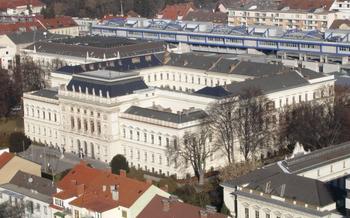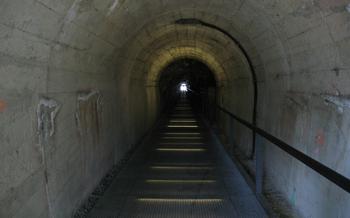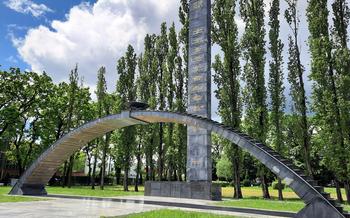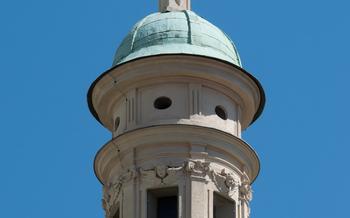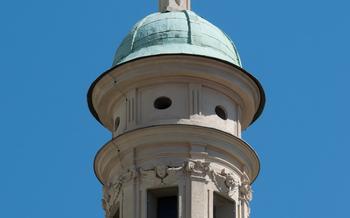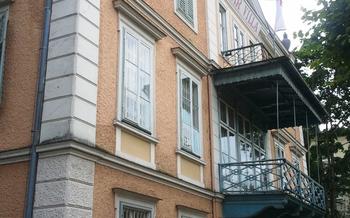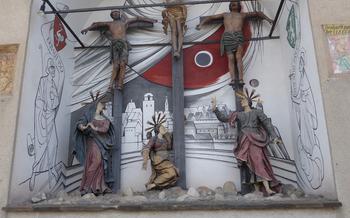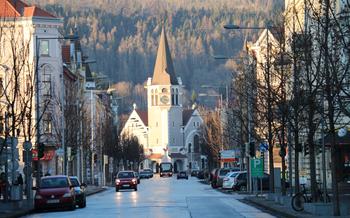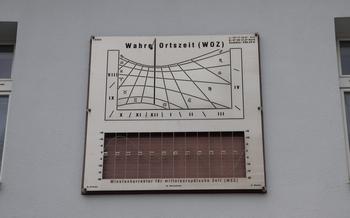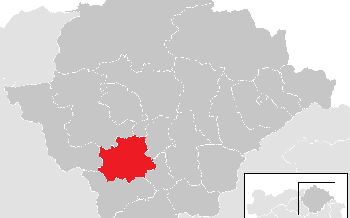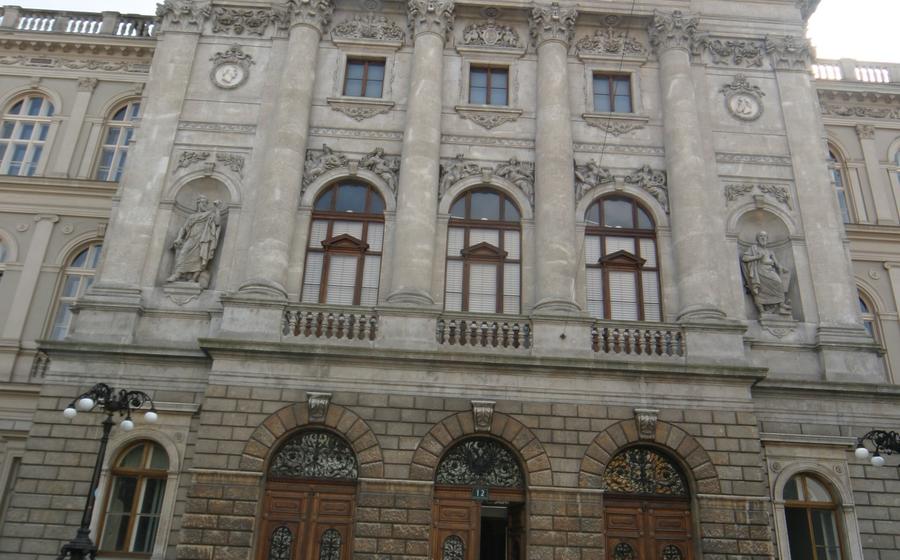
Graz University of Technology (Alte Technik)
- Graz University of Technology (Alte Technik)
- Architecture and Design
- History and Evolution
- Campus Life and Student Culture
- Notable Alumni and Faculty
- Public Events and Exhibitions
- Guided Tours and Open Days
- Photography and Social Media
- Transportation and Accessibility
- Getting to TU Graz
- Tips for International Visitors
- Nearby Attractions and Activities
- Accommodation Options
- Insider Tip: Unlock the Hidden Gems of TU Graz
Graz University of Technology (Alte Technik)
Graz University of Technology (Alte Technik), also known as the Old Technical University of Graz, holds a prominent position among Austria's esteemed institutions of higher learning. Founded in 1811 as the Joanneum Polytechnic Institute, it has played a pivotal role in shaping the technological landscape of the region. In 1864, the university moved into its current premises, an architectural masterpiece designed by the renowned architect Friedrich von Schmidt in the Neo-Gothic style. This iconic building, known as the Alte Technik, remains a symbol of academic excellence and innovation in Graz.
Location
The Graz University of Technology is strategically situated in the heart of the city, adjacent to the river Mur. This prime location provides easy access to the university's various faculties, departments, and research centers, as well as the city's vibrant cultural and social scene. The university is well-connected by public transportation, making it easily accessible for students, staff, and visitors alike.
Architecture and Design
The Graz University of Technology (Alte Technik) is a masterpiece of Neo-Gothic architecture, showcasing intricate details, symbolism, and allegory. The building's exterior features elaborate carvings, pointed arches, and flying buttresses, reminiscent of medieval cathedrals. The interior spaces are equally impressive, adorned with ornate columns, vaulted ceilings, and stained-glass windows that bathe the halls in colorful light.
The architects skillfully incorporated symbolism and allegory into the building's design. The entrance is flanked by statues representing science and art, while the central tower is crowned with a statue of Nike, the Greek goddess of victory. The building's many intricate details, such as the gargoyles and grotesques that adorn the exterior, add to its charm and character.
In recent years, the building has undergone extensive renovation and preservation efforts to restore it to its original glory. These efforts have included meticulous cleaning and restoration of the stonework, as well as the repair and replacement of damaged elements. The result is a stunningly preserved example of 19th-century Neo-Gothic architecture that continues to inspire and awe visitors from around the world.
History and Evolution
Graz University of Technology (TU Graz) has a rich and storied history, dating back to its founding in 1811 as the Joanneum Polytechnic Institute. Initially, it was housed in the Joanneum building in the city center, but as the institution grew and expanded, the need for a dedicated campus became apparent.
In the late 19th century, the university began to acquire land on the outskirts of Graz, and in 1895, construction commenced on the new campus. The centerpiece of the campus was the Alte Technik building, which was designed in the Neo-Gothic style by renowned architect Friedrich von Schmidt. Completed in 1901, the Alte Technik became the symbol of TU Graz and remains one of the most iconic landmarks in the city.
During World War II, the campus suffered significant damage from Allied bombings. However, after the war, the university quickly began the process of reconstruction and expansion. New buildings were added to the campus, and the Alte Technik was painstakingly restored to its former glory.
In the 1960s and 1970s, TU Graz experienced a period of rapid growth and modernization. New academic programs were introduced, research facilities were expanded, and the campus was further expanded to accommodate the growing number of students and faculty.
In the 21st century, TU Graz continues to evolve and adapt to the changing needs of society. The university has invested heavily in new research infrastructure, and it has established a new campus in the city center to house its business and social sciences programs. Today, TU Graz is a leading university of technology and natural sciences, with a global reputation for excellence in research and teaching.
Campus Life and Student Culture
Graz University of Technology boasts a vibrant and diverse student community, creating a lively and stimulating campus atmosphere. With over 13,000 students from countries worldwide, TU Graz fosters a truly international and multicultural environment.
The university offers a wide range of clubs and organizations that cater to various interests and passions, from sports and music to cultural and academic pursuits. These clubs provide opportunities for students to connect, socialize, and pursue their hobbies outside the classroom.
The campus also features excellent sports facilities and recreational activities. The university's sports center offers a variety of indoor and outdoor sports, including basketball, football, tennis, and swimming. There are also numerous recreational areas on campus, such as parks, gardens, and a scenic riverside promenade, where students can relax, study, or socialize.
To promote international exchange and collaboration, TU Graz actively participates in various international student exchange programs. These programs allow students to study abroad at partner universities, gain valuable international experience, and expand their global network.
Notable Alumni and Faculty
Graz University of Technology boasts a remarkable roster of distinguished alumni and faculty members who have made significant contributions to science, technology, and society. Among them are:
-
Viktor Kaplan (1876-1934), a pioneer in hydraulic engineering, known for his invention of the Kaplan turbine, widely used in hydroelectric power plants.
-
Wolfgang Pauli (1900-1958), a theoretical physicist and Nobel laureate, who formulated the Pauli exclusion principle, a cornerstone of quantum mechanics.
-
Erwin Schrödinger (1887-1961), a theoretical physicist and Nobel laureate, known for his groundbreaking work on wave mechanics and the Schrödinger equation.
-
Friedrich Mohs (1773-1839), a mineralogist and geologist, who developed the Mohs scale of mineral hardness, still used today to assess the scratch resistance of minerals.
-
Josef Ressel (1793-1857), an engineer and inventor, who is credited with designing the first ship propeller, revolutionizing naval propulsion.
-
Ferdinand Porsche (1875-1951), an automotive engineer and designer, who founded the Porsche company and created iconic sports cars like the Porsche 356 and Porsche 9
-
Waltraud Klasnic (1945-present), an architect and urban planner, known for her innovative and sustainable designs, including the renovation of Graz's historic city center.
-
Peter Skalicky (1951-present), a computer scientist and software engineer, who co-founded the software company SAP, a global leader in enterprise resource planning (ERP) systems.
-
Gertrude Pohler (1920-2009), a chemist and food technologist, who pioneered the development of instant coffee and revolutionized the global coffee industry.
-
Christian Doppler (1803-1853), a physicist and mathematician, who discovered the Doppler effect, a fundamental phenomenon in wave propagation and the basis of many modern technologies like radar and sonar.
These notable individuals, along with many other accomplished graduates and faculty members, have shaped the university's reputation for academic excellence and innovation, leaving a lasting impact on various fields of science, engineering, and technology.
Public Events and Exhibitions
Graz University of Technology offers a diverse range of public events and exhibitions throughout the year, providing opportunities for the community to engage with the university's academic and research activities.
Open Lectures and Workshops:
- The university regularly hosts open lectures and workshops led by renowned experts and researchers from various fields. These events offer insights into cutting-edge research and provide a platform for knowledge exchange between academia and the public.
Art Exhibitions and Cultural Performances:
- The university's art gallery showcases contemporary art exhibitions by local and international artists, fostering a vibrant cultural atmosphere on campus. Additionally, theater productions, concerts, and dance performances are organized throughout the year, showcasing the talents of students and faculty members.
Science Fairs and Technology Demonstrations:
- Graz University of Technology hosts science fairs and technology demonstrations that showcase the latest innovations and research projects from across the university's departments. These events provide an interactive and engaging way for visitors to learn about the practical applications of scientific research.
Community Engagement Initiatives:
- The university actively engages with the local community through initiatives such as public lectures, workshops, and outreach programs. These events aim to promote scientific literacy, foster collaboration between academia and industry, and contribute to the social and economic development of the region.
Guided Tours and Open Days
Graz University of Technology welcomes visitors to explore its historic campus and learn about its rich history and academic achievements through guided tours and open days. These tours offer an immersive experience, allowing visitors to step into the past and witness the university's evolution from its humble beginnings to its current status as a leading institution of higher education.
Availability and Booking Information:
Guided tours are typically offered on weekdays during the academic year, with limited availability during the summer months. Advance booking is recommended to secure a spot, especially for groups or school visits. Visitors can book tours online through the university's website or by contacting the admissions office directly.
Highlights of the Tour:
The guided tours take visitors through the university's most iconic buildings, including the Alte Technik, the main administrative building, and the Neue Technik, which houses the Faculty of Engineering. Visitors will learn about the university's history, its academic programs, and its contributions to science, technology, and society.
Duration and Cost:
Tours typically last for about an hour and are conducted in English or German. The cost of the tour is minimal, and group discounts may be available. Visitors should arrive at the meeting point a few minutes before the tour starts to ensure a smooth check-in process.
Special Tours for Groups and Schools:
The university offers customized tours for groups of 10 or more people, including school groups, corporate teams, and international delegations. These tours can be tailored to specific interests, such as architecture, engineering, or research. Advance booking is required for group tours, and additional fees may apply.
Photography and Social Media
The Graz University of Technology campus is a treasure trove of photo opportunities, with its stunning architecture, picturesque courtyards, and vibrant student life. Whether you're an aspiring photographer or simply looking to capture your TU Graz experience, here are some tips to help you make the most of your visit:
- Instagram-worthy Spots:
-
Main Building: The iconic neo-Gothic facade of the main building is a must-see for any photographer. Don't forget to capture the intricate details of the carvings and sculptures that adorn the exterior.
-
Courtyards: The university's courtyards offer a tranquil oasis amidst the bustling campus. With their lush greenery, historical fountains, and beautiful architecture, they make for a perfect backdrop for photos.
-
Library: The university library is a treasure trove of architectural details and stunning interiors. Capture the grand staircase, the ornate reading rooms, and the vast collection of books that line the shelves.
-
Tips for the Best Shots:
-
Use Natural Light: Make the most of the natural light during the golden hours of sunrise and sunset to capture the best colors and shadows.
-
Play with Angles: Experiment with different angles and perspectives to create dynamic and interesting compositions.
-
Capture Student Life: The campus is alive with student activity. Capture candid shots of students studying, socializing, or participating in events to showcase the vibrant atmosphere of TU Graz.
-
Share Your Experience:
-
Social Media: Share your photos on social media using the hashtag #TUGraz to connect with other visitors and share your TU Graz experience with the world.
-
Travel Blog: If you have a travel blog, consider writing a post about your visit to TU Graz, including your photos and insights.
Transportation and Accessibility
Getting to TU Graz
Public Transportation: - Conveniently located near public transportation hubs, TU Graz is easily accessible by bus, tram, and subway. - Plan your journey using the Graz Linien public transportation app or website.
Parking: - Limited parking spaces available on campus, subject to fees. - Consider using public transportation or alternative modes of transport like cycling or walking.
Accessibility: - TU Graz strives to be inclusive and accessible to all visitors. - Wheelchair-accessible entrances, elevators, and ramps are available throughout the campus. - Dedicated parking spaces for disabled visitors are also provided.
Bike-Friendly Campus: - Graz is a bike-friendly city, and TU Graz reflects this with its extensive bike paths and storage facilities. - Explore the campus and surrounding areas on two wheels for a sustainable and healthy mode of transportation.
Tips for International Visitors
Visa requirements and entry regulations:
Citizens of most countries do not require a visa to enter Austria for stays of up to 90 days. However, it is always advisable to check the latest visa requirements with the Austrian embassy or consulate in your home country before traveling.
Currency exchange and financial matters:
The official currency of Austria is the Euro. You can exchange your currency at banks, exchange bureaus, and ATMs. Credit cards are widely accepted in Austria, but it is a good idea to have some cash on hand for small purchases and tips.
Language barriers and communication:
German is the official language of Austria, but English is widely spoken, especially in tourist areas. If you do not speak German, it is helpful to learn a few basic phrases before your trip.
Cultural etiquette and customs:
Austrians are generally friendly and welcoming, but it is important to be aware of some local customs. For example, it is considered polite to greet people with a handshake or a kiss on the cheek (if you are close friends). It is also important to be on time for appointments and meetings.
Nearby Attractions and Activities
Graz offers a wealth of attractions and activities just a stone's throw from the Graz University of Technology. Explore the city's historic center, a UNESCO World Heritage Site, with its charming medieval streets, Gothic architecture, and vibrant cultural scene. Visit the Graz Art Museum, the Styrian Armoury, or the Eggenberg Palace to delve into the region's rich history and artistic heritage.
Nature enthusiasts can escape the urban bustle and head to the nearby Plabutsch Mountain, a popular spot for hiking, biking, and paragliding. Graz is also an excellent base for day trips to nearby cities and towns, such as Vienna, Salzburg, or Ljubljana, each offering unique cultural and historical experiences. Explore the vineyards of Southern Styria, immerse yourself in the thermal springs of Bad Gleichenberg, or conquer the Dachstein Glacier, Austria's highest mountain.
Accommodation Options
Graz University of Technology (TU Graz) offers a range of on-campus housing options for students, ensuring a convenient and vibrant living experience. These accommodations include dormitories, student apartments, and shared flats, providing students with a variety of choices to suit their preferences and budget. The on-campus housing is well-equipped with modern amenities, study spaces, and communal areas, fostering a sense of community and collaboration among residents.
For visitors and travelers seeking accommodation near the university, there are numerous hotels and guesthouses located within walking distance or a short public transportation ride. These accommodations offer a range of options, from budget-friendly hostels to upscale hotels, catering to different needs and preferences. Additionally, apartments and vacation rentals are available for those seeking a more independent and home-like experience.
When it comes to finding affordable accommodation, there are several tips to keep in mind. Booking in advance, especially during peak travel seasons, can help secure better rates. Exploring options a bit further from the city center can also lead to more budget-friendly choices while still being well-connected by public transportation. Student discounts and special offers are often available, so it's worth inquiring about these when making reservations.
Insider Tip: Unlock the Hidden Gems of TU Graz
Beyond the iconic sights and attractions, TU Graz holds a treasure trove of hidden gems waiting to be discovered. For a truly immersive experience, venture off the beaten path and uncover the university's lesser-known secrets.
-
Secret Garden Oasis: Amidst the bustling campus, find solace in the serene Secret Garden, a hidden sanctuary tucked away behind the Alte Technik building. This tranquil haven offers a peaceful retreat for contemplation or a quiet picnic.
-
Historical Lecture Hall: Step back in time and attend a lecture in the historic lecture hall, lovingly preserved in its original splendor. This atmospheric venue transports you to a bygone era, allowing you to experience the university's rich academic heritage firsthand.
-
Rooftop Panoramas: Ascend to the rooftop of one of the campus buildings to be rewarded with breathtaking panoramic views of Graz and its surroundings. Capture stunning photographs or simply soak in the beauty of the cityscape from this unique vantage point.
-
Student Theater Productions: Discover the vibrant student theater scene at TU Graz. Catch a captivating performance at the university's intimate theater, showcasing the talents of aspiring actors, directors, and playwrights.
-
Late-Night Study Sessions: Experience the camaraderie and energy of late-night study sessions in the university library. Join fellow students as they collaborate, share ideas, and prepare for exams in this dynamic environment.
Embrace the spirit of exploration and uncover the hidden treasures of TU Graz. These insider tips will lead you to unforgettable moments and a deeper appreciation for the university's rich history and vibrant culture.
